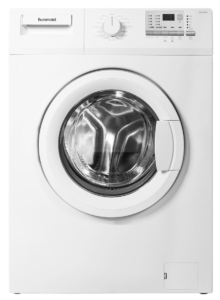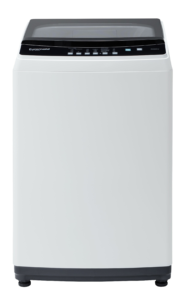Laundry day can feel like a blessing and a curse depending on how much you’ve let the weeks dirty laundry pile up. Whether you prefer lots of smaller, separate loads or just want to spread the task over a day or so, a small washing machine could be an ideal choice for you. They’re the compact option that offer a range of benefits for smaller households, so read on to find out more about small washing machines in this Canstar Blue guide.
Why buy a small washing machine?
A small washing machine is most suited to those living on their own or in an apartment where space is limited. A small washing machine helps maximise smaller living spaces while maintaining the cleaning power of a full-sized machine. The standard small sized washer is approximately 900 x 550 x 550mm (HxWxD) in size, making them accessible for most cabinet dimensions. For one to two people, a smaller washing machine may also help to cut down on electricity and water bills.
Small washing machine pros and cons
There are a number of benefits to owning a small washing machine, but with any appliance, there can be some drawbacks.
Pros:
- Convenient for smaller loads of laundry
- Uses less water and energy per wash cycle compared to a standard size washing machine
- Ideal for smaller laundry spaces
- Suit households with fewer people
Cons:
- Inconvenient if you have a large load or a number of loads to complete quickly
- Some models have a lower star energy rating
- With lower spin speeds, clothes may take longer to dry if they contain more water at the end of a cycle
How much do small washing machines costs?
A small washing machine will generally fall below an 8kg capacity and can cost from $500 to just over $1,000. For people on a tighter budget who can sacrifice some of the washing capacity, a small washing machine could be an ideal choice as a first time buy. Brand like Lemair, Electrolux and Euromaid all sell small washing machines with capacities from 5kg to 7kg.
Types of small washing machine
There are two types of small washing machine: a top loader and a front loader. Both models serve similar functions to standard size front and top loaders but are simply smaller.
Small front loader washing machine

A front loader washing machine is designed with the door on the front (hence the name) and has a separate compartment for the washing detergent to go in. Front loader washing machines tend to have a greater capacity and uses a tumbling motion to wash your clothes, picking them up and dropping them into the water repeatedly as the drum turns.

Small top loader washing machine
Top loader washing machines are a more basic appliance offering fairly simple features and settings but they still get the job done. You can access the drum to wash your clothes from the top and the laundry detergent can either be placed in the central section or directly on the clothes depending on how you like them washed.
Should I buy a small washing machine?
Whether or not you buy a small washing machine will come down to personal preference and lifestyle. If you’re someone who needs to do a lot of loads of laundry each week, then a small washing machine may not be ideal. However, if you only do one or two smaller loads a week or have a smaller laundry room space, it could be a great choice. If you’re still uncertain about a small washing machine or which type to buy, compare different washing machine brands below.
Compare Front Load Washing Machines
Original Author: Veronika Hleborodova




Share this article